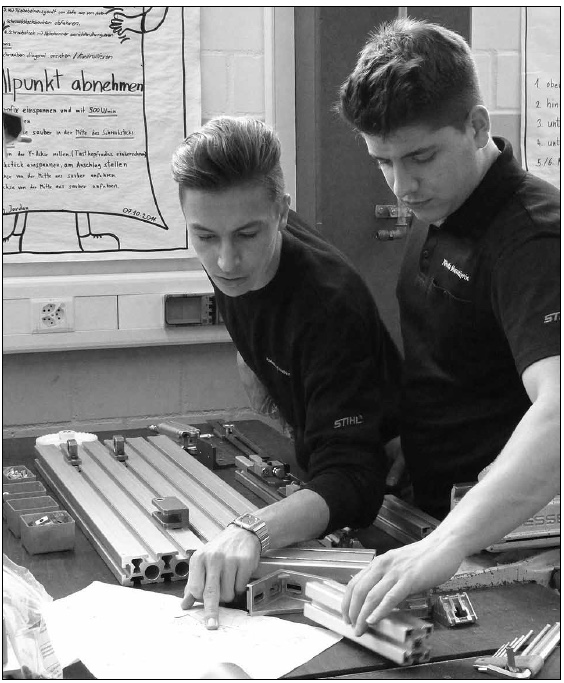Success factor vocational education
Success factor vocational education
by Pierre-Gabriel Bieri, Centre Patronal
The Swiss system of vocational education works well. It is being praised in official speeches and some countries envy us. However, our system suffers from the fact that part of society has the tendency to idealise academic education. It is also necessary to emphasise the important role of professional associations in the context of vocational education.

(picture STIHL)
Thousands of unoccupied apprenticeship places
If politics is still arguing about how the system of retirement is to be organised, there is a much greater consensus on the other end of professional life. Everyone in Switzerland praises the merits of vocational education, being close to the working world and its imponderabilities and which prepares most young people efficiently to master a profession and find a job. Federal Councillor Johann Schneider-Ammann uses every international forum and official visit to promote the dual vocational education system in Switzerland, which is currently being studied by several other countries, even on the other side of the Atlantic.
This enthusiasm, however, must not be restricted to political speeches. At a time when vocational education is looking for a “Vision 2030”, which is currently limited to a catalogue of good intentions, professional training deserves to be understood and promoted at all levels. Even though the Swiss system works well, improvements are still possible. In particular with regard to the attractiveness of vocational training in general and some professions in particular, or with regard to the suitability of young people for the qualifications required.
Not so long ago there were complaints about missing apprenticeship places and pressure was exerted on the companies to get more involved. It has been realised for some years now, that the situation is more complex and heterogeneous. According to a “barometer” published by the Swiss Confederation, 71,700 young people are interested in finding an apprenticeship in 2017, compared to 66,000 in 2016. The companies themselves offer 79,000 places. But in mid-summer, the media reported more than 11,000 seats that could not be occupied yet.
The vocational education is not a second choice!
The numbers fluctuate, but the reality is that every year numerous apprenticeship places remain unoccupied while some adolescents fail to find a job. It is no surprise that vacancies are found in the technical, mechanic or practical professions, which at first glance appear to be less attractive. In order to attract learners the companies from the sectors addressed need to strengthen their communication in the future. But to explain the disproportion between supply and demand, young people are also to be mentioned who do not correspond to the desired profiles of the training companies. Sometimes, the instructors complain about the weak level of young people leaving compulsory school, or even problems with their behavior.
Another persistent accusation concerns the all too frequently expressed devaluation of the vocational education in the eyes of the pupils. Their parents, their teachers, even the school authorities have the tendency to idealise the academic education by letting the vocational education appear a second choice. This regrettable attitude particularly affects some of the cantons of West Switzerland, perhaps influenced by its proximity to France. It leads to an additional burden for the high schools, then for the universities, and results in a worryingly high dropout rate of students. Fortunately, today an increasing interest in study courses of the universities of applied sciences (“Fachhochschulen”, FH) can be observed, which have a more practical focus. That applies in particular for holders of vocational school-leaving certificate.
The professional associations in the frontline
The enthusiasm for the academic education entails, above all, the risk of provoking a discrepancy to the needs of the industries and companies. These needs, however, are crucial to draw attention to the new generations of useful and interesting career opportunities. The companies and the professional associations are regularly in need of new talent, more than the “labor market” – an abstract concept. In this sense, it is necessary to emphasise the essential role of professional associations in the organisation of vocational education, which is even more important than that of enterprises, even if they are large. The experts know what they need today, and they are the best to determine what they will need tomorrow.
This role of professional associations, as laid down in Article 1 of the Federal Act on Vocational and Professional Education and Training, should be at the heart of all official speeches and all considerations of the future. •
Source: Press and Information Center Centre Patronal from 27 September 2017 (No. 2248)
(Translation Current Concerns)